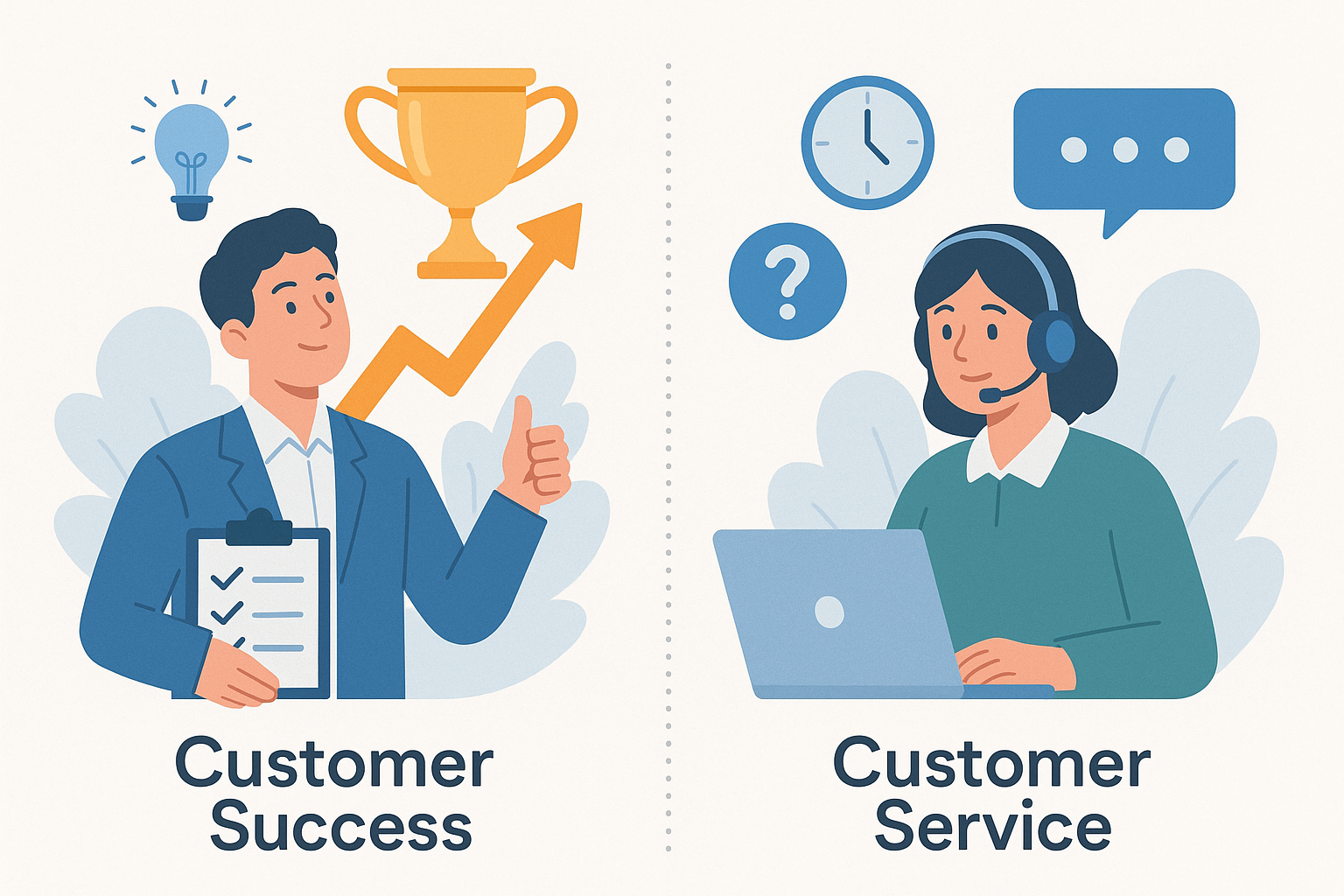Customer Success vs. Customer Service: What's the Difference?

Discover the distinctions between customer success and customer service and how they contribute to a business's growth.
Understanding Customer Success
Customer success is a concept that focuses on ensuring the long-term success and satisfaction of customers. It involves proactively working with customers to help them achieve their desired outcomes and maximize the value they receive from a product or service. Understanding customer success involves recognizing that customer satisfaction goes beyond just resolving individual issues or providing support. It requires a holistic approach that involves building strong relationships, understanding customer needs, and continuously delivering value.
By prioritizing customer success, businesses can foster loyalty, increase customer retention, and drive growth. It involves going beyond traditional customer service and adopting a proactive mindset to help customers achieve their goals and overcome challenges.
To understand customer success, it's important to consider the customer journey and the various touchpoints where businesses can provide value. This includes onboarding customers effectively, providing ongoing support and guidance, and continuously monitoring and measuring customer satisfaction and success metrics.
Overall, understanding customer success means recognizing the importance of long-term customer relationships and actively working towards helping customers achieve their desired outcomes.
Exploring the Role of Customer Service
Customer service, on the other hand, focuses on addressing and resolving customer issues, inquiries, and complaints. It plays a crucial role in ensuring customer satisfaction and maintaining a positive brand image. Customer service typically involves reactive interactions with customers, where the goal is to provide timely assistance and resolve any problems they may be facing.
Customer service teams are responsible for handling customer inquiries, providing product information, troubleshooting technical issues, processing orders, and resolving complaints. They are often the first point of contact for customers and play a vital role in building trust and maintaining strong customer relationships.
While customer service is an essential aspect of customer success, it is not the sole focus. Customer success encompasses a broader set of activities aimed at ensuring the overall success and satisfaction of customers, while customer service focuses more on handling individual customer interactions and resolving immediate concerns.
Both customer success and customer service are critical for business success, but they have different roles and objectives within the customer journey.
Key Differences between Customer Success and Customer Service
The key differences between customer success and customer service can be summarized as follows:
1. Focus: Customer success focuses on ensuring the long-term success and satisfaction of customers, while customer service focuses on addressing immediate customer concerns.
2. Proactiveness vs. Reactiveness: Customer success takes a proactive approach by actively working with customers to help them achieve their goals, while customer service is more reactive, responding to customer inquiries and issues as they arise.
3. Outcome-Driven vs Issue-Driven: Customer success focuses on helping customers achieve their desired outcomes and value from the products or services. Customer service primarily deals with resolving specific issues or problems faced by customers.
4. Relationship vs. Transaction: Customer success emphasizes building strong, long-term relationships with customers, while customer service is often transactional in nature, focusing on resolving individual customer problems.
5. Metrics: Customer success is measured by factors such as customer retention, expansion, and advocacy, while customer service is often measured by metrics like response time, resolution time, and customer satisfaction scores.
By understanding these key differences, businesses can develop strategies to effectively balance customer success and customer service to drive overall customer satisfaction and business growth.
The Importance of Customer Success
Customer Success is vital for the success and growth of a business. By actively working with customers to ensure their success, companies can increase customer satisfaction, loyalty, and advocacy. Satisfied customers are more likely to renew their subscriptions, make repeat purchases, and recommend the company to others, thereby fueling revenue growth.
Furthermore, customer success helps in identifying upselling and cross-selling opportunities by understanding the specific needs and goals of individual customers. By tailoring solutions and offering additional products or services that align with customer requirements, companies can increase their average revenue per customer and drive incremental growth.
Overall, customer success contributes to business growth by fostering strong customer relationships, reducing churn, and generating new revenue streams through successful customer outcomes.
By prioritizing customer success, businesses can achieve the following benefits:
1. Increased customer retention: By focusing on the long-term success and satisfaction of customers, businesses can improve customer retention rates. Satisfied customers are more likely to continue using a product or service and become loyal advocates.
2. Higher customer lifetime value: When customers achieve their desired outcomes and receive ongoing value from a product or service, they are more likely to increase their spending and expand their usage over time. This leads to higher customer lifetime value and increased revenue.
3. Positive brand reputation: Providing exceptional customer success experiences can help businesses build a positive brand reputation. Satisfied customers are more likely to share their positive experiences, refer others to the business, and leave positive reviews and testimonials.
4. Competitive advantage: In a competitive market, customer success can be a key differentiator. Businesses that prioritize customer success and consistently deliver value are more likely to stand out from the competition and attract new customers.
Overall, customer success is essential for businesses to thrive in today's customer-centric landscape. It is not just about resolving individual customer issues but about ensuring the long-term success and satisfaction of customers.
The Role of Customer Service for Growth
Customer service also plays a vital role in business growth. It directly impacts customer satisfaction and loyalty, which are crucial for retaining existing customers and attracting new ones. Exceptional customer service can differentiate a company from its competitors and create a positive brand image.
When customers receive prompt and efficient support, their overall experience improves, leading to higher levels of satisfaction and increased likelihood of repeat business. Positive word-of-mouth and online reviews stemming from excellent customer service can also attract new customers and drive business growth.
Moreover, customer service teams often act as a valuable source of customer feedback. By gathering insights on customer needs, pain points, and preferences, companies can make informed decisions to improve their products, services, and overall customer experience, ultimately driving business growth.
Strategies for Achieving Success
To achieve customer success, businesses can implement the following strategies:
1. Understand customer needs: By deeply understanding customer needs, businesses can tailor their products, services, and support to meet those needs effectively. This involves conducting customer research, leveraging data and analytics, and actively listening to customer feedback.
2. Provide proactive guidance: Instead of waiting for customers to reach out with issues, businesses can proactively provide guidance and support to help customers achieve their goals. This can include offering tutorials, training resources, and personalized recommendations.
3. Foster strong relationships: Building strong relationships with customers is crucial for customer success. This involves regular communication, personalized interactions, and proactive check-ins to ensure customers are on track and satisfied.
4. Measure and track success metrics: To assess customer success efforts, businesses should define and track relevant metrics such as customer retention rates, expansion rates, and customer satisfaction scores. This helps identify areas for improvement and measure the impact of customer success initiatives.
5. Continuously improve and iterate: Customer success is an ongoing process. Businesses should continuously gather feedback, analyze customer data, and iterate on their strategies to ensure they are consistently delivering value and meeting customer needs.
By implementing these strategies, companies can drive customer success, enhance customer satisfaction, and ultimately achieve long-term business growth. To determine the best approach for you and your team, let's chat.



